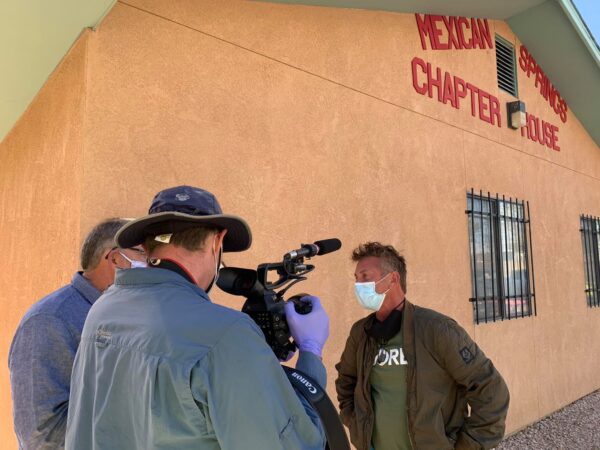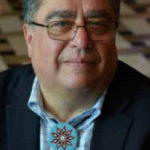
- Details
- By Levi Rickert
OPINION - A recent article that we published entitled “A-list celebrities rally for #NavajoStrong: PSAs feature Ellen DeGeneres, Mark Hamill, Marisa Tomei, more,” received some online pushback. Some readers questioned the motives of celebrities who have lent their names and time to help the Navajo Nation as it deals with large numbers of COVID-19 positive cases and deaths.
The severity of the COVID-19 pandemic on the Navajo Nation is real. Last Monday, the HuffPost reported “Navajo Nation marked a grim milestone on Sunday, recording more coronavirus cases per capita on its reservation than any of the 50 U.S. states.”
Compounding the struggles of those battling COVID-19 is the fact that thousands of Navajo Nation citizens do so without the basics of running water or electricity. The CDC recommendation to wash their hands for 20 seconds presents a challenge when they don’t have 20 seconds’ worth of running water to accomplish this basic hygiene task. Nor can they stock up on groceries during the time of curfew because they lack the necessary electricity to power a refrigerator or freezer.
When celebrities lend their names to help the cause, I think they should be applauded.
Americans are fascinated with celebrities. And, celebrities come in various artistic tastes and genres.
 Levi Rickert
Levi Rickert
Certainly, marketers are well aware of the power of celebrity. They engage with celebrities all the time to sell a product or push a cause. I’d hazard a guess that not many of our readers have heard of Michael Boehm from Batavia, Illinois. But most of them have surely heard of George Foreman, the ex-heavyweight boxing champion of the world. Boehm was the creator of the George Foreman Grill, manufactured by Spectrum Brands, that has sold over 100 million grills. The success of the product came largely thanks to the name recognition of its celebrity spokesman.
Talk about the power of celebrity.
The power of celebrity came up during an interview I conducted with Dennis Banks (Ojibwe), one of the co-founders of the American Indian Movement, in 2009 when he recounted the important contribution made by iconic film actor Marlon Brando, one month after the February 1973 takeover of Wounded Knee.
On March 27, 1973, Brando won the Academy Award for Best Actor for his performance in The Godfather. However, he didn’t attend the Academy Awards that night. Instead, he sent Sacheen Littlefeather (White Mountain Apache and Yaqui), who was dressed in traditional regalia, to represent him before a national television audience of tens of millions of people. The auditorium audience cheered and booed as Littlefeather began to read a 15-page letter from Brando declining the award. Littlefeather was cut off after only 60 seconds, but the impact of Brando’s protest was made. The next day, The New York Times published the letter in its entirety.
“Celebrating an industry that had systematically misrepresented and maligned American Indians for six decades, while at that moment 200 Indians were under siege at Wounded Knee, was ludicrous,” Brando later wrote in his autobiography.
Banks told me the national press had not paid enough attention to the Wounded Knee takeover. He said it wasn’t until Brando had Littlefeather walk on the Oscar stage that the media began to give the takeover adequate attention. Public opinion swung in favor of the American Indian Movement’s efforts at Wounded Knee.
Fast-forward to the Standing Rock resistance to the Dakota Access oil pipeline that began with a small camp in April 2016. Because of social media coverage, word spread quickly in Indian Country. Thousands of American Indians and their allies traveled to Standing Rock to be part of the Indigenous movement. On August 11, 2016, actress Shailene Woodley, heroine of the Divergent movie series, was among 10 people arrested at Standing Rock. Because of her celebrity, the national press gave Standing Rock attention for the first time.
As summer turned to fall, thousands of American Indians went to Standing Rock to join the Indigenous movement. Woodley was arrested for a second time at Standing Rock on Indigenous Peoples’ Day. Her arrest made national headlines. As more famous people showed up at Standing Rock, such as the Reverend Jesse Jackson, Rosario Dawson, Robert F. Kennedy, Jr., Jane Fonda, Leonardo DiCaprio, and Mark Ruffalo, the national press followed, as well as the international press.
Now with the COVID-19 outbreak, celebrities have once again come to the aid of Indian Country.
On Friday, Academy-winning actor Sean Penn showed up to assist with food and water distribution on the Navajo Nation. Donning a face mask, he showed that he was not afraid to get his shoes dusty. It was the second time within a month that Penn was present on the Navajo Nation.
We need not question his motives or the motives of other celebrities who make public efforts to show their compassion. The power of their celebrity brings the attention to Indian Country’s needs that can potentially have a lasting impact.
Levi Rickert (Prairie Band Potawatomi Nation) is the publisher and editor of Native News Online.
More Stories Like This
Native News Weekly (August 25, 2024): D.C. BriefsUS Presidents in Their Own Words Concerning American Indians
Flanagan Calls ICE Agents ‘out of control’ after Woman Killed in Minneapolis
American Indigenous Tourism Association Announces New Board Members
Deb Haaland Talks Youth, Jobs and Opportunity in Governor Bid
Help us defend tribal sovereignty.
At Native News Online, our mission is rooted in telling the stories that strengthen sovereignty and uplift Indigenous voices — not just at year’s end, but every single day.
Because of your generosity last year, we were able to keep our reporters on the ground in tribal communities, at national gatherings and in the halls of Congress — covering the issues that matter most to Indian Country: sovereignty, culture, education, health and economic opportunity.
That support sustained us through a tough year in 2025. Now, as we look to the year ahead, we need your help right now to ensure warrior journalism remains strong — reporting that defends tribal sovereignty, amplifies Native truth, and holds power accountable.
 The stakes couldn't be higher. Your support keeps Native voices heard, Native stories told and Native sovereignty defended.
The stakes couldn't be higher. Your support keeps Native voices heard, Native stories told and Native sovereignty defended.
Stand with Warrior Journalism today.
Levi Rickert (Potawatomi), Editor & Publisher

